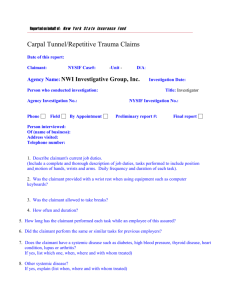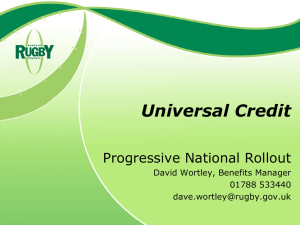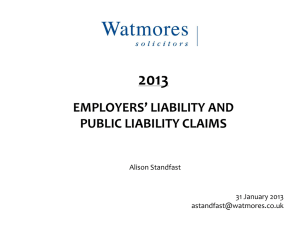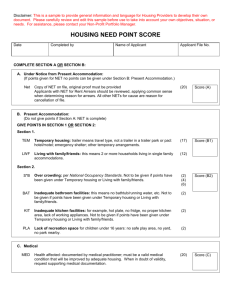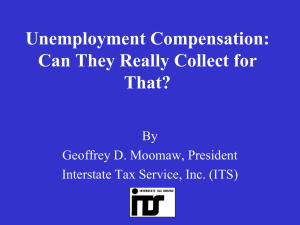APA tier factors
advertisement
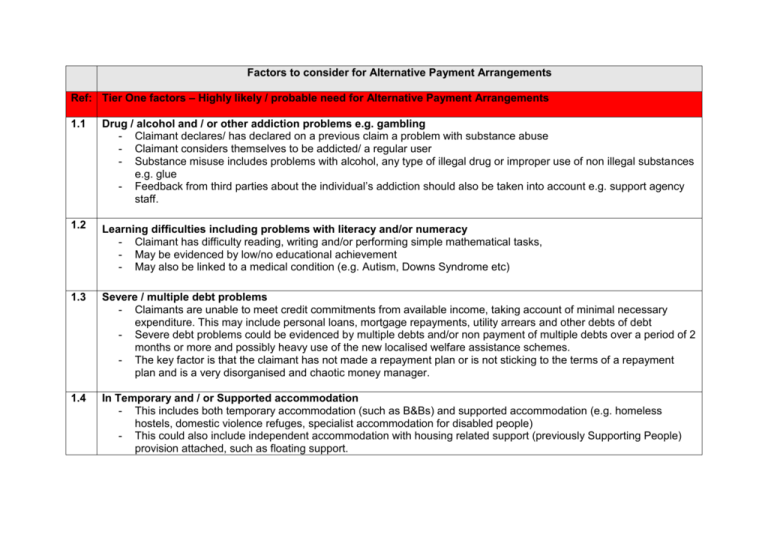
Factors to consider for Alternative Payment Arrangements Ref: Tier One factors – Highly likely / probable need for Alternative Payment Arrangements 1.1 Drug / alcohol and / or other addiction problems e.g. gambling - Claimant declares/ has declared on a previous claim a problem with substance abuse - Claimant considers themselves to be addicted/ a regular user - Substance misuse includes problems with alcohol, any type of illegal drug or improper use of non illegal substances e.g. glue - Feedback from third parties about the individual’s addiction should also be taken into account e.g. support agency staff. 1.2 Learning difficulties including problems with literacy and/or numeracy - Claimant has difficulty reading, writing and/or performing simple mathematical tasks, - May be evidenced by low/no educational achievement - May also be linked to a medical condition (e.g. Autism, Downs Syndrome etc) 1.3 Severe / multiple debt problems - Claimants are unable to meet credit commitments from available income, taking account of minimal necessary expenditure. This may include personal loans, mortgage repayments, utility arrears and other debts of debt - Severe debt problems could be evidenced by multiple debts and/or non payment of multiple debts over a period of 2 months or more and possibly heavy use of the new localised welfare assistance schemes. - The key factor is that the claimant has not made a repayment plan or is not sticking to the terms of a repayment plan and is a very disorganised and chaotic money manager. 1.4 In Temporary and / or Supported accommodation - This includes both temporary accommodation (such as B&Bs) and supported accommodation (e.g. homeless hostels, domestic violence refuges, specialist accommodation for disabled people) - This could also include independent accommodation with housing related support (previously Supporting People) provision attached, such as floating support. - Consider only if the claimants status in this accommodation impedes their ability to manage their financial affairs effectively as some types of accommodation will be short stay, but others will have longer tenancies of two years of more and many claimants will be able to manage the UC single monthly payment. The focus should be more around the type of ‘support’ provided rather than the accommodation type when considering if Alternative Payment Arrangements are appropriate. 1.5 Homeless - As per the Housing Act 1996, a claimant is homeless if they have no accommodation that it is safe or reasonable for them to occupy, or if they are expected to have no access to accommodation within 28 days. - In practice, this includes people who are rough sleeping, people who are sofa surfing with friends or relatives, people in hostels, people who are about to be evicted and people in unsafe and unsuitable accommodation such as squats. - Should have been homeless for more than 2 weeks or not at the same address for no more than 1 month. - But do consider that some claimants who are homeless may still be financially capable. 1.6 Domestic violence and abuse - Claimants who are currently suffering domestic abuse, or have had domestic abuse inflicted on them. - This includes any incident of threatening behaviour, violence or abuse (psychological, physical, sexual, financial or emotional) between adults who are or have been intimate partners or family members regardless of gender or sexuality. This can also include forced marriage and so-called “honour crimes”. - Abuse that forms a pattern of coercive and controlling behaviour e.g. controlling the other person by using a variety of financial means 1.7 Mental Health Condition - Claimant has a mental health condition (e.g. phobia, bi-polar disorder, severe depression) which impairs their ability to manage their own affairs effectively - Feedback from a third party about the symptoms that the individual has should be taken into account, including any evidence from legacy information held. Currently in rent arrears / threat of eviction / repossession - Claimant is currently in arrears with their rent for an amount equal to or more than two months of their rent - Claimant has continually underpaid their rent over a period of time, and they have accrued arrears of an amount equal to or more than one month’s rent 1.8 - Claimant has been evicted for rent arrears within the last 12 months - Claimant is subject/ threatened with eviction and/or repossession. 1.9 Claimant is young either a 16/17 year old and / or a Care leaver - 16/17 year olds – many will have limited if no financial capability and in order to claim UC will have to be in some form of hardship already (i.e. estranged from parents, have a child, be sick/disabled etc.) - Care Leavers – Claimants who have recently been in local authority care and includes those over 17, most claimants leave care at 18, but some leave as early as 16 or as late as 25. 1.10 Families with multiple and complex needs - Claimant is part of a family that is part of the Troubled Families Programme - Other families with multiple and complex needs could include a combination of persistent offending behaviour, persistent anti-social behaviour, mental health issues, drugs and alcohol issues, domestic violence, safeguarding issues and debt - Feedback from third parties e.g. family intervention case worker about the complex and overlapping nature of problems in the claimants’ family should be taken into account Tier Two factors – Less likely / possible need for Alternative Payment Arrangements 2.1 Third party deductions in place (e.g. for fines, utility arrears etc) - Claimant is currently making payments from benefit to repay utility arrears (e.g. gas, water, electricity) - Or will be considered for rent arrears deductions as they are more than 2 months in arrears with their rent 2.2 Claimant is a Refugee / asylum seeker - This definition applies to those claimants who have been granted refugee status, with indefinite leave to remain and with recourse to public funds within the last 12 months. - Claimant is an asylum seeker who is eligible to claim DWP benefits while their application is being processed - Their status impedes their ability to manage their own financial affairs effectively 2.3 History of rent arrears - Claimant is not in arrears but may have been within the last 12 months and was subject / threatened with eviction and / or possession. - Consider the fact that the claimant may now be financially capable and able to manage their own financial affairs effectively. 2.4 Previously homeless and / or in supported accommodation - Claimant was homeless (as per definition above) within the last 12 months but is now in suitable accommodation. Claimant has moved from supported housing into independent accommodation within the last 12 months. Consider the fact that the claimant may now be financially capable and able to manage their own financial affairs effectively. 2.5 Other disability (e.g. physical disability, sensory impairment etc). - Claimant has a disability/ impairment not covered by the ‘mental health section that impairs their ability to manage their own financial affairs effectively 2.6 Claimant has just left prison - Claimant has left prison within 3 months of making their claim to UC. - Consider only if their status impedes their ability to manage their UC financial affairs effectively, budgeting support may be the answer rather than an Alternative Payment Arrangement. Claimant has just left hospital - Claimant has just left hospital within 3 months of making claim to UC. - Consider only if their status impedes their ability to manage their UC financial affairs effectively, budgeting support may be the answer rather than an Alternative Payment Arrangement. 2.7 2.8 Recently bereaved - Claimant has suffered the loss of close family member (as described in social fund guidance) within the last 3 months. - Consider only if their status impedes their ability to manage their UC financial affairs effectively, budgeting support may be the answer rather than an Alternative Payment Arrangement. 2.9 Language skills (e.g. English not spoken as the ‘first language’). - Claimant does not speak/understand English or does not speak/understand English as their first language. - Consider only if their status impedes their ability to manage their UC financial affairs effectively, budgeting support may be the answer rather than an Alternative Payment Arrangement. 2.10 Ex Service personnel - Claimant was a member of HM forces and was discharged within the last 18months. (This does not include civilian posts with HM forces or any reserve organisations e.g. Territorial Army). - Consider only if their status impedes their ability to manage their UC financial affairs effectively, budgeting support may be the answer rather than an Alternative Payment Arrangement. 2.11 NEETs - Claimant is aged 18-24 and not in education, employment or training. Consider only if their status impedes their ability to manage their UC financial affairs effectively, budgeting support may be the answer rather than an Alternative Payment Arrangement.

